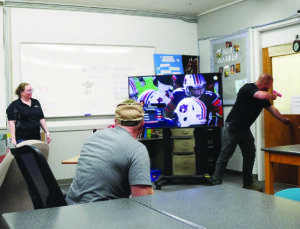
by John Dowd
Last Friday, twenty-nine members of local mental health organizations, EMT and paramedic services, fire stations, police departments and the county sheriff’s office attended a unique training opportunity. For the first time since COVID-19, Ravalli County hosted a Crisis Intervention Team (CIT) training academy for local responders. The academy’s goal was to give responders an edge in determining when they are dealing with mental health crises, and how to respond accordingly for the safety of the patient, the responders, and those around them.
The academy was organized by Ravalli County Sheriff’s Office Behavioral Health Manager Jaime Biesiot and Ravalli County Detective Dan Mendonca, acting as the law enforcement liaison. It was held at Victor School, which gave the agencies the run of one of the school wings for the week. This was the sixth academy of its kind done in the county, and was operated through CIT Montana, a statewide program through Montana Department of Justice that standardizes this kind of crisis response training.
The week-long, 40-hour course combines many aspects, including assessment, intervention, de-escalation, legal considerations, a veteran’s panel and more. Over the week, participants learned to recognize and address substance abuse, elderly and child issues, developmental disabilities, various mental illnesses, and much more.
At the end of the week, students participated in live scenarios to test their knowledge. These scenarios were rigorous, difficult and sometimes emotionally taxing. The scenarios were pulled from real-world calls responders have seen in Montana.
Local mental health experts, and those who have taken CIT in the past, acted in these scenarios, pushing students to confront genuinely challenging situations, often requiring them to make difficult decisions based on little information. These scenarios were geared to simulate real situations responders might need to deal with on the job.
During one such scenario, responders entered a classroom as if it was a residence. In the residence, two individuals were watching football with the volume turned up and both residents were extremely intoxicated, to the point of being mildly combative. At the same time, and in another room behind a door, slightly shrouded, another individual was threatening themself with a knife. The intoxicated individuals were encouraging the suicidal individual to commit self harm, and were much more interested in watching their football game than obeying responders. There was no indication of whether or not there were other weapons, or other hidden individuals in the house and responders had to use their given training tools to make numerous correct calls under various stresses. According to one of the actors, Jim Sontag, even with all the distractions these scenarios are often mild compared to real life, which is difficult to reproduce. A real situation would, “probably be louder, with dogs barking and just absolute chaos,” said Sontag.
On top of all that chaos, responders need to learn to be calm under the pressure, in order to save these individuals who may intend harm to themselves, others and even the responders.
According to Biesiot, this training “gives them tools to understand and respond to behavioral health.” This sentiment was echoed by Ravalli County Sheriff Stephen Holton, who said this kind of training can change the way they respond. “This is super beneficial for our guys,” said Holton. Holton wanted to extend his thanks to Biesiot and Mendonca, saying, “I want to give my appreciation to Jamie and Dan for taking this on. It is a lot of work.”
Biesiot added that the training is also being both taught, and attended, by local experts, many of whom operate in these responders’ area. According to Biesiot, this collaboration involving numerous people from other area agencies helps build relationships between the agencies, as well as gives responders the added benefit of “knowing who they are calling” when they need to hand off an individual.
“We are putting a face to those other people, and making those connections so we can better serve,” said Biesiot.
One student that attended the training, Victoria Miralda, is a U.S. Army veteran as well as founder and president of Veterans Victory Alliance. Her organization strives to offer first responders programming in nature to address overall wellness. They often work with individuals that are combating mental and emotional wounds from both military and first responder service. She was notified by Holton that it might be a good idea for her to come out and take the course. She said that she found the academy extremely informative and useful for what they could encounter in their organization.
In her time with the academy, Miralda said she was extremely impressed with the Ravalli County deputies in particular, “seeing the depth of their commitment to this community and willingness to learn. My hat’s off to Sheriff Holton and this culture that they have established.”
Miralda also mentioned something several other students and instructors noticed. Throughout the academy, it became clear to her and others of the need for a “mobile committed crisis prevention team,” like one that operates in Missoula. This would be a group of individuals trained specifically to respond to these kinds of scenarios and to offer these patients the best possible response, care and handoff. Another student to mention the need for such a team was Sara Monroe, a paramedic with Bitterroot Health. Though, “we are a long way from a committed CIT team,” said Monroe, these “valuable skills” can act as a way to bridge that gap, and give the responders of Ravalli County an edge to help these individuals.